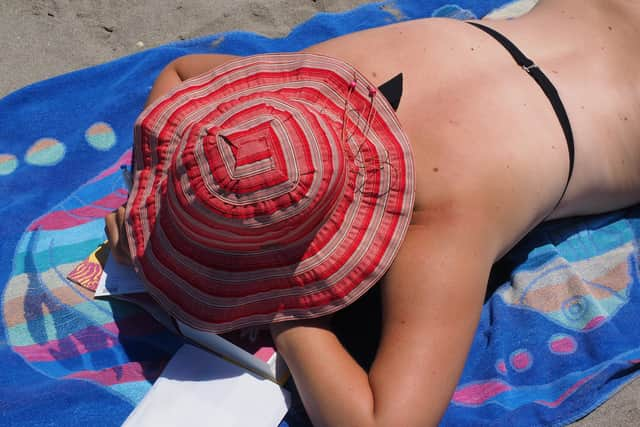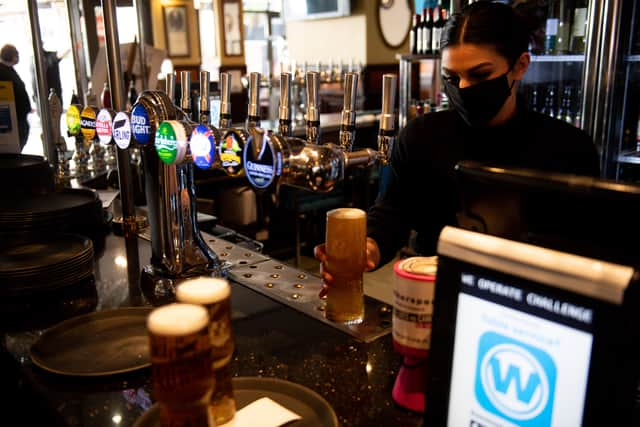Covid-19 NI - Popular NI summer holiday destinations to be included in green list
and live on Freeview channel 276
For more on this story please scroll down.
LIVE UPDATES: Popular NI summer holiday destinations to be included in green list
Foreign Office reveals low-risk holiday locations ahead of green list release


The green list for foreign holiday destinations is not expected to be published until later this week, but Government travel advice gives an indication of what destinations could be on it.
Tourists visiting a number of popular summer hotspots do not face a level of risk for coronavirus that is “unacceptably high”, according to the latest updates from the Foreign, Commonwealth and Development Office (FCDO).
The FCDO is not advising against non-essential travel to Portugal (excluding the Azores), Spain’s Canary Islands or the Greek islands of Rhodes, Kos, Zante, Corfu and Crete.
The ban on foreign holidays is expected to be lifted for people in England from May 17 as part of the next easing of coronavirus restrictions.
A risk-based traffic light system will be introduced, with different rules for returning travellers depending on which list their destination is on.
People arriving from a green location will not have quarantine, while those returning from somewhere on the amber list must self-isolate for at least five days.
The red list requires a 10-night stay in a quarantine hotel at a cost of £1,750 for solo travellers.
Assessments will be based on a range of factors, including the proportion of a country’s population that has been vaccinated, rates of infection, emerging new variants, and the country’s access to reliable scientific data and genomic sequencing.
There is no guarantee that the green list will match the FCDO’s travel advice, but the latter indicates the Government’s current evaluation of the risks to tourists.
Travel advice was updated on April 14 for Portugal, in October 2020 for the Canary Islands and the following month for the five Greek islands.
An FCDO spokesman said: “Whilst travelling abroad for holidays is currently not permitted there are exemptions allowing overseas travel for listed essential reasons.
“It is important that British nationals travelling or living overseas have access to the most up to date travel advice to help them make informed decisions about international travel and plan for a safe trip.”
Sixty per-cent reduction in hospital admissions over the last seven days - zero deaths and 83 new infections detected in last 24 hours


Hospital admissions concerning Covid-19 have reduced by approximately 60 per cent in Northern Ireland over the last seven days.
In the seven days to Monday May 3, 15 people with Covid-19 were admitted to hospital. This is 22 fewer inpatients admitted to hospital over the previous seven days.
The Department of Health (DoH) recorded now new Covid-19 related deaths in the last 24 hours however a male aged between 40 and 59 died in hospital in the Antrim and Newtownabbey council area over the May Day bank holiday weekend.
The total number of Covid-19 related deaths in Northern Ireland since the beginning of pandemic now stands at 2,146.
The DoH also recorded 83 new infections in the last 24 hours.
This takes the total number of positive cases over the last seven days and since the beginning of the pandemic to 632 and 120,501 respectively.
Up to midnight on Monday May 3 there were 62 inpatients with Covid-19.
There were 82 intensive care unit (ICU) beds in Northern Ireland, seven of which were occupied by patients with Covid-19; 59 were occupied by patients with non-Covid conditions and 16 were unoccupied.
Hospital bed capacity is currently at 100 percent.


TUV leader and MLA Jim Allister has described restrictions prohibiting an elderly woman from seeing her beloved husband in hospital as "cruel".
Mr. Allister was critical of the the way the Northern Ireland Executive was easing restrictions.
“As I sit here I am reading correspondence with a constituent who is an older woman,” said Mr. Allister.
“The woman’s husband is currently sick in hospital and it is unlikely he will recover.
“The woman and her family were told only one person could visit the man.
“This meant the family had to pick one person.
“Due to the woman’s age the family nominated the eldest son.
“The elderly lady might never see her husband alive again.
“This is just cruel,” said Mr. Allister.
No evidence drinking alcohol interferes with Covid vaccines, regulator says


There is no evidence that drinking alcohol after a Covid-19 vaccine interferes with how it works, a UK regulator has said.
The Medicines and Healthcare products Regulatory Agency (MHRA) was responding to social media reports that people should abstain from drinking for up to two weeks after a vaccine.
In January, advisers to the alcohol education charity Drinkaware, which is funded by the alcohol industry, said there was some evidence that drinking, especially regular heavy drinking, could interfere with the body’s ability to build immunity in response to some vaccines.
But there is nothing in the patient information leaflets from the NHS or the vaccine manufacturers to suggest such a link.
A spokeswoman for the MHRA told the PA news agency: “There is currently no evidence that drinking alcohol interferes with the efficacy of the Covid-19 vaccines.
“We would advise anyone concerned about this to talk to their healthcare professional.”
Covid-19 vaccine to be approved for 12 to 15 year-olds within days


The Pfizer-BioNTech vaccine is set to be approved within days in the USA and by June in the European Union for children aged between 12 and 15 years-old.
There are no plans to offer a vaccine to children between 12 and 15 in Northern Ireland at the moment but it’s likely that this may change.
At present, some older children in Northern Ireland (aged 12 and over) at very high risk of exposure and serious outcomes, such as older children with severe neuro-disabilities and recurrent respiratory infections that require residential care, should be offered a vaccination.
NHS England is believed to be considering offering a vaccine to secondary school pupils before the beginning of the new academic year in September 2021 - it would be reasonable to expect that, if approved, this new initiative would be deployed in Scotland, Wales and Northern Ireland.
Although not confirmed, the move to vaccinate secondary school children would make the closing down schools less likely.
It is not yet known whether the United Kingdom government would seek to offer the Pfizer-BioNTech or the AstraZeneca vaccine.
Medical experts have stated that vaccinating young people is an almost inevitable step a government must take if it is to stand any chance of reaching so-called ‘herd immunity’.
Comment Guidelines
National World encourages reader discussion on our stories. User feedback, insights and back-and-forth exchanges add a rich layer of context to reporting. Please review our Community Guidelines before commenting.
